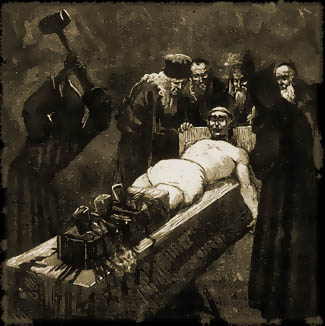1252 The papacy legalizes torture by the Inquisition
The medieval Inquisition has a terrible reputation for cruelty and intolerance; the notion that officials of the church established by Jesus Christ would participate in the torment and death of unbelievers seems abhorrent to us today. Indeed, it was, at first and for centuries, abhorrent to the Church. It was only when the Roman Empire officially became Christian and governments undertook to maintain the uniformity of religion that was force used against heretics and dissidents. Still the Church tried to hold itself apart from the infliction of death and pain. Clerics were forbidden to shed blood or to participate in proceedings that might lead to capital punishment and the Church refused to sanction the old Germanic customs of trial by ordeal or combat. But the rise of powerful heresies that seemed to challenge the fundamentals of not only the Church but civilization itself seemed to call for new measures.
In the thirteenth century the dualist heresy known as Catharism or Albigensianism took root in western Europe. It denied most of the Bible, claimed that the god of the Old Testament was an evil bungler, repudiated the sacraments, and discouraged marriage and procreation. It won the adherence, or at least toleration, of many local rulers and even churchmen in northern Italy and southern France, causing the Church to doubt the ability of bishops to detect and root out the problem. For this reason, the papacy authorized a central Inquisition with the power to question believers as to their faith and morals. At first these tribunals were kept from using the well-established powers of torture which the secular courts possessed, but as heretic resistance increased to the point of assassinating church officials, it was decided that sterner measures had to be taken.
On May 15, 1252 Pope Innocent IV issued the bull Ad extirpanda which permitted torture in the question of heretics but which limited its use. It stated:
To root up from the midst of Christian people the weed of heretical wickedness, which infests the healthy plants more than it formerly did, pouring out licentiousness through the offices of the enemy of mankind in this age the more eagerly (as we address ourselves to the sweated labor of the task assigned us) the more dangerously we overlook the manner in which this weed runs riot among the Catholic growth. Desiring, then, that the sons of the church, and fervent adherents of the orthodox faith, rise up and make their stand against the artificers of this kind of evildoing, we hereby bring forth to be followed by you as by the loyal defenders of the faith, with exact care, these regulations, contained serially in the following document, for the rooting-up of the plague of heresy. . . The head of state or ruler must force all the heretics whom he has in custody, provided he does so without killing them or breaking their arms or legs, as actual robbers and murderers of souls and thieves of the sacraments of God and Christian faith, to confess their errors and accuse other heretics whom they know, and specify their motives, and those whom they have seduced, and those who have lodged them and defended them, as thieves and robbers of material goods are made to accuse their accomplices and confess the crimes they have committed.
Because jurists knew that torture could often produce false results, the Church, for a time, insisted that it be only a last resort, only be imposed once and used only when proofs of guilt were almost certain. Unfortunately, these strictures were before too long ignored or evaded and the Inquisition came to merit a large part of the shame that is heaped upon it to this day.
